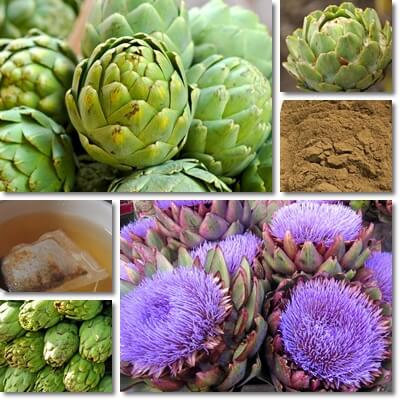Many people use dietary supplements such as magnesium supplements and artichoke extract to lower their blood pressure. In addition to dietary supplements that are good for high blood pressure specifically, a healthy diet and clean, active lifestyle with a focus on weight control can back up blood pressure-lowering efforts. But just how good is artichoke extract for high blood pressure? Here is everything you need to know about the extract and its benefits for blood pressure.
What is artichoke extract made of?
Artichoke extract is a type of concentrated dietary supplement. It can be made from one or multiple plant parts such as artichoke leaves or bracts, artichoke hearts, stem or flowering heads. The defining characteristic of artichoke extract is that it contains a higher concentration of biologically active components from the plant which may differ from one extract to another. The various phenolics found in the extract may include Quercetin, Apigenin-7-glucoside, chlorogenic acid, narirutin, luteolin, cynarin, silymarin etc.

What is high blood pressure?
High blood pressure, formally known as hypertension, is a chronic health condition characterized by continuously elevated blood pressure in the arteries. It is a serious medical condition that predisposes to severe outcomes in the form of cardiovascular events such as atherosclerosis, heart failure, heart attack, cardiac arrest, stroke as well as loss of vision and kidney disease.
Treatment options rely heavily on medication such as diuretics, ACE inhibitors, calcium channel blockers etc. with strong recommendations for a low-sodium diet, weight management through diet and exercise, and a healthy lifestyle (no smoking, no drinking).
Dietary supplements such as magnesium supplements, potassium supplements are incredibly effective at lowering blood pressure numbers. Similarly, natural remedies such as herbal teas (e.g. hawthorn tea, rose hip tea, sea-buckthorn tea, artichoke tea) and herbal supplements such as artichoke extract can further assist with high blood pressure management.
Here are all the ways artichoke extract can help you if you have high blood pressure.

5 Benefits of artichoke extract for high blood pressure
Direct anti-hypertensive action
Luteolin is a flavone antioxidant in artichoke and artichoke extract, and a range of other plants with medicinal properties.
Research shows luteolin activates enzymatic reactions that trigger the production of nitric oxide. Nitric oxide acts as a cell messenger, signaling the smooth muscles of blood vessels to relax and dilate.
This, in turn, improves blood flow and causes blood pressure numbers to drop achieving anti-hypertensive effects.
A randomized controlled clinical trial also suggest that various biologically active chemicals in artichoke and extract (special phenolics and antioxidants) can potentially hold benefits for lowering blood pressure numbers, specifically systolic blood pressure, and body mass index.
Metabolic management (anti-diabetic effects)
Another way artichoke extract is good for high blood pressure is via metabolic management, that is, management of markers of metabolic syndrome. Metabolic syndrome is a collection of health issues such as excess body weight, most notably central obesity (excess fat around the waist), high blood sugar, insulin resistance, high blood cholesterol and high blood pressure, and predisposes to diabetes and associated complications (e.g. kidney damage, loss of vision, neuropathy).
A number of studies have showed that supplementation with artichoke extract can be an effective tool in reducing glycometabolic parameters such as blood sugar and blood cholesterol, contributing to metabolic control and, indirectly, better blood pressure numbers.
In a human study, supplementation with an artichoke extract reduced fasting blood glucose, markers of insulin resistance and blood lipids pattern in overweight subjects with IFG, or impaired fasting glycemia (higher than normal blood sugar levels during fasting).
In another study, artichoke leaf extract supplementation in metabolic syndrome decreased blood oxidized LDL cholesterol levels. An ethanol artichoke leaf extract also showed hypoglycemic benefits by delaying carbohydrates and lipid digestion and absorption and exerting antioxidant benefits that achieved the protection of vital organs that can be damaged by high blood sugar levels and oxidative stress in an anti-diabetic effect (source).
Benefits for appetite control
Dietary supplementation with an extract from artichoke and the common bean has been revealed to help reduce body mass index (BMI) as well as reduce hunger, improving appetite control and contributing to benefits for weight management (source). This indirectly contributes to benefits for blood pressure management.
Prebiotic, bifidogenic benefits
Extensive research demonstrates gut flora has a meaningful impact on weight status, with certain beneficial gut bacteria species contributing to better weight management and a healthier weight, reducing risks of metabolic disease and associated high blood sugar, high blood cholesterol and high blood pressure levels.
Artichoke is a prebiotic with positive effects on beneficial gut bacteria. Research shows daily consumption of a very-long-chain inulin from globe artichoke has a pronounced prebiotic effect, as revealed by microbiota composition of human stools, and is well tolerated, with little to no side effects (except for mild bloating and associated discomfort).
Another study suggests inulin from artichoke has a long lasting bifidogenic effect on Bifidobacterium bifidum ATCC 29521 cultures, known to exert anti-inflammatory effects, with potential benefits for colitis, and also in mixed cultures of colonic bacteria.
Anti-obesity benefits
High blood pressure is favored by being overweight and obese. Studies demonstrates artichoke extract reduces blood sugar levels and improves appetite control, helping reduce hunger and contributing to better weight management which indirectly holds benefits for high blood pressure. Research also shows artichoke extract helps improve body mass index (BMI) via anti-hyperglycemic and anti-hypolipidemic activities as well as prebiotic, bifidogenic effects, resulting in anti-obesity benefits that favor healthier blood cholesterol, blood sugar and blood pressure profiles.
